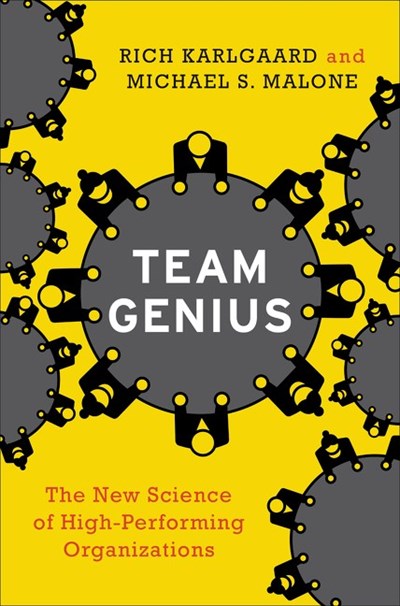Uncategorized Posts
-

Blog / Interviews
Rich Karlgaard & Michael S. Malone on Business and Books
By Dylan Schleicher
In which we learn what questions the authors still have about business and what books have influenced them.
Categories: interviews
-

Blog / Interviews
A Q&A with Rich Karlgaard & Michael S. Malone
By Dylan Schleicher
We continue our Thinker in Residence with Rich Karlgaard and Mike Malone with some questions about their great new book, Team Genius.
Categories: interviews
-

Blog / Interviews
Rich Karlgaard & Michael S. Malone
By Dylan Schleicher
In Team Genius, Rich Karlgaard and Michael S. Malone have teamed up to tell why "More than ever, business success now comes down to teams."
Categories: interviews
-

Blog / Staff Picks
Muse: A Novel: A Review
Book Review by Porchlight
Jonathan Galassi, the President of Farrar, Straus, and Giroux, gives us a beautiful tale of publishing and poetry, and the important difference between the two.
Categories: staff-picks
-

Blog / Book Giveaways
The Achievement Habit: Stop Wishing, Start Doing, and Take Command of Your Life
By Porchlight
Bernard Roth, the academic director and one of the founders of Stanford's famed d. school, teaches us how to make achievement a habit.
Categories: giveaways
-

Blog / Blog
Behind the Bestseller List June 2015
By Blyth Meier
A closer look at three of the books on June's Bestseller List.
-

Blog / Jack Covert Selects
The Achievement Habit: Stop Wishing, Start Doing, and Take Command of Your Life
By Dylan Schleicher
In his new book, Bernard Roth, a professor of engineering and academic director at Stanford's famous d. school, teaches us how to engineer a better life.
Categories: jack-covert-selects
-

Blog / Staff Picks
The Wolf in Sheep's Clothing: Hilary Mantel's Wolf Hall and Bring Up the Bodies
Book Review by Sally Haldorson
Not unexpectedly, there are plenty of leadership lessons, or perhaps warnings, one can draw out of these two Booker Prize winning novels about Thomas Cromwell's 'reign' as King Henry the VIII's primary advisor.
Categories: staff-picks
-

Blog / ChangeThis
Transforming Business—Successfully
By Satish P. Subramanian
"Enterprises everywhere are experiencing the 'business outcome gap. ' The business outcome gap can be defined as the difference between desired business outcomes and realized business outcomes. Desired outcomes are changing in response to rapidly evolving stakeholder needs, whether the stakeholders are employees, customers, or shareholders. Globalization, disruptive technologies, smart devices, and social media have all had a profound effect on how we approach work and get important programs done. While realized outcomes may be improving, for most enterprises the increase in desired outcomes is far outstripping the realized. Not only do enterprises see a business outcome gap, but also the lack of innovation to stay relevant to the dynamic needs of the customer and market. In order to close the business outcome gap, constantly innovate, and get more customer centric, enterprises are increasingly embarking on business transformation programs or large-scale strategic projects. However, according to a recent study, organizations lose an average of a staggering $109 million for every $1 billion spent on projects.
Categories: changethis
-

Blog / ChangeThis
Is Educating All Children Possible? (Based on the Status Quo, No.)
By Don Berg
"Linda Darling-Hammond, in the preface to her 1997 book The Right to Learn: A Blueprint for Creating Schools That Work, wrote: 'Rigid and bureaucratic, [our current education system] was never designed to teach all children effectively, to teach learners in all their varieties, to attend to each child's particular mix of aptitudes and barriers to learning. Educating all children effectively is the mission of schools today, yet great numbers of children still have no reasonable opportunity to acquire the knowledge and abilities that will help them thrive in and contribute to today's society. ' As Linda Darling-Hammond points out in the quote above history has rendered judgments about the outcomes of our school system that do not reflect well on our record of success, assuming that the goal is to educate all our future citizens. Historically there have been (and remain) large segments of the United States population that have been educationally neglected despite the mandate to attend school.
Categories: changethis

